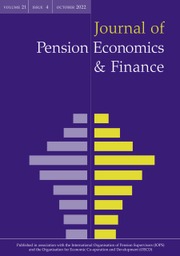Article contents
How the COVID-19 pandemic could reduce near-retirees' Social Security benefits
Published online by Cambridge University Press: 08 October 2020
Abstract
A quirk in the Social Security benefit formula interacting with the sharp economic downturn due to the COVID-19 pandemic could cause certain groups of near-retirees to suffer significant and permanent reductions to their Social Security retirement benefits. A sudden decline in the Social Security Administration (SSA)'s measure of economywide average wages in the year a worker turns 60 causes the Social Security benefit formula to devalue all the worker's earnings prior to age 60, resulting in a lower measure of career-average earnings and a lower benefit in retirement. A middle-income worker aged 60 in 2020 could receive an annual Social Security benefit reduction of around 9%, with losses through retirement approaching $46,000. Individuals becoming eligible for Social Security Disability Insurance benefits would be subject to similar reductions in percentage terms. Several methods are discussed to reduce or eliminate the likelihood of similar benefit ‘notches’ occurring in the future.
- Type
- Article
- Information
- Copyright
- Copyright © The Author(s), 2020. Published by Cambridge University Press
References
- 3
- Cited by


